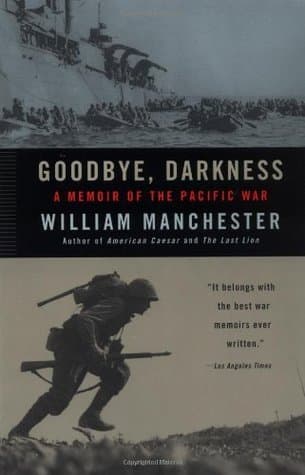
Book Review Summary: Goodbye, Darkness: A Memoir of the Pacific War
Introduction
"Goodbye, Darkness: A Memoir of the Pacific War" by William Manchester is a deeply personal and emotional account of the author's experiences during World War II. Manchester, a renowned historian and biographer, revisits the battle sites where he fought as a young Marine and reflects on the impact of war on his life. This book offers a compelling blend of history, personal reflection, and emotional depth, making it a powerful and memorable read for readers interested in the Pacific Theater of World War II.
About William Manchester
William Raymond Manchester was an American author and biographer known for his bestselling books on historical figures such as Douglas MacArthur, John F. Kennedy, and himself. Manchester's writing style was characterized by his ability to delve into the human experience, exploring themes of war, social history, and personal growth. He received numerous accolades for his work, including the National Humanities Medal and the Abraham Lincoln Literary Award. Manchester's writing was known for its honesty, insightfulness, and ability to captivate readers with its emotional depth.
Analysis of Views
-
Emotional Depth and Personal Reflection: Many readers praised Manchester's ability to convey the emotional impact of war on individuals. His honest and unflinching account of his experiences in the Pacific War resonated with readers who appreciated the raw and unfiltered nature of his storytelling. Manchester's willingness to delve into his own emotions and struggles added depth and authenticity to the narrative.
-
Historical Insight: Readers appreciated Manchester's historical context and background knowledge. While the book is primarily a personal memoir, Manchester's extensive research and understanding of the broader context of the war added depth and nuance to his story. Readers felt that he provided valuable insights into the Pacific Theater of World War II, enriching their understanding of the conflict.
-
Engaging Writing Style: Manchester's writing style was widely praised for its engaging and captivating nature. Readers found his descriptions of battles, landscapes, and personal experiences vivid and immersive. His ability to convey the horrors of war while maintaining a sense of empathy for his fellow soldiers made for a compelling reading experience.
-
Parallelism between Past and Present: Some readers appreciated Manchester's exploration of the parallels between his experiences during the war and his observations of post-war society. His reflections on how past events shape individuals and societies resonated with readers who appreciated his ability to draw connections between different time periods.
-
Honesty and Reflection: Manchester's willingness to confront his own shortcomings, regrets, and personal struggles during the war was highly valued by readers. His introspective approach added depth to the memoir and allowed readers to connect with him on a deeper level. The book's exploration of the psychological impact of war on individuals was particularly impactful for many readers.
Reasons for Recommendation
-
Emotional Depth: Manchester's ability to convey the emotional impact of war on individuals is a significant reason why readers recommend this book. The memoir offers a raw and honest account of the author's experiences, providing readers with a deeply personal glimpse into the human side of war.
-
Historical Insight: Manchester's extensive knowledge of the Pacific Theater during World War II adds historical context to the narrative, making it an informative read for those interested in the broader context of the conflict. His insights into military strategy, battles, and their consequences provide valuable insights for readers seeking a deeper understanding of the war.
-
Engaging Writing Style: Manchester's captivating writing style captures readers' attention from beginning to end. His vivid descriptions of battles, landscapes, and personal experiences create a sense of immersion that makes it difficult to put down the book. The engaging narrative keeps readers invested in Manchester's story throughout.
Reasons for Not Recommendation
-
Inaccuracy Concerns: Some readers expressed concerns about inaccuracies in Manchester's account of his experiences during World War II. They felt that he fabricated details or embellished events to create a more dramatic narrative, which detracted from the overall authenticity of the memoir. These concerns may deter readers who prioritize historical accuracy in their reading choices.
-
Lack of Objectivity: Manchester's memoir is not an objective historical account but rather a deeply personal reflection on his experiences during the war. Readers who expect a more objective recounting of events may find it lacking in that regard. While this aspect adds depth to the memoir, it may not appeal to those seeking a more detached perspective on historical events.
Conclusion
"Goodbye, Darkness: A Memoir of the Pacific War" by William Manchester is a powerful and emotionally resonant memoir that offers readers an intimate glimpse into the experiences of a young Marine during World War II. Manchester's honest portrayal of his own struggles and emotions adds depth and authenticity to the narrative, while his extensive knowledge of the Pacific Theater provides historical context for readers seeking a deeper understanding of the conflict. While some readers have expressed concerns about inaccuracies and lack of objectivity, many find the book's emotional depth and engaging writing style compelling reasons to recommend it as a must-read for fans of historical memoirs or those interested in World War II history.